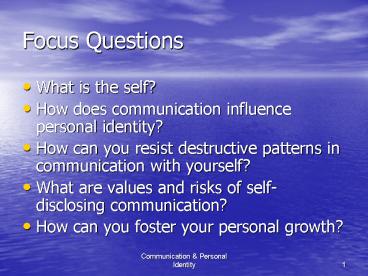Focus Questions - PowerPoint PPT Presentation
1 / 9
Title:
Focus Questions
Description:
Focus Questions What is the self? How does communication influence personal identity? How can you resist destructive patterns in communication with yourself? – PowerPoint PPT presentation
Number of Views:64
Avg rating:3.0/5.0
Title: Focus Questions
1
Focus Questions
- What is the self?
- How does communication influence personal
identity? - How can you resist destructive patterns in
communication with yourself? - What are values and risks of self-disclosing
communication? - How can you foster your personal growth?
2
Communication Personal Identity
- Self is a process. Continuously evolves and
changes. - The self consists of perspectives
- Views about ourselves,
- about others, and
- about social life that changes over time as we
interact with others.
3
The self arises in communication with others
- Self is not innate but is acquired.
- Self-fulfilling prophesy expectations, judgment
of ourselves (internalized labels) - Particular others parents, siblings, peers
- Reflected appraisals a process of seeing
ourselves through the eyes of others - Generalized others collection of rules, roles
- Communicated by people we interact with,
- By media,
- By institutions Judicial system, marriage,
education system
4
Communication with family members
- Direct definition Explicitly told
- Identity scripts Rules of living and identity of
a family - Attachment styles Patterns of parenting how to
approach relationship (next slide) - Secure attachment Consistent, attentive
self-worth - Fearful attachment Rejecting, abusive unworthy
of love - Dismissive attachment Rejecting, abusive
dismissing others as unworthy - Anxious/ambivalent attachment Inconsistent
parenting assuming others right / self unworthy
of love
5
Attachment Styles
Views of self
Positive
Negative
Secure
Anxious/Ambivalent
Positive
Consistent, attentive self-worth
Inconsistent parenting assuming others right /
self unworthy of love
Views of others
Dismissive
Negative
Fearful
Rejecting, abusive unworthy of love
Rejecting, abusive dismissing others as unworthy
6
Communication with Peers
- Playmates, classmates, friends, partners
- Reflected appraisals
- Social comparisons
- Judgment about talents, qualities, abilities
- Self-disclosure
- Revelation of personal information about
ourselves - Hopes, fears, experiences, perceptions
- The Johari Window four types of information
(knowledge) about us (p. 214)
7
The Johari Window
Known to self
Unknown to self
Known to others
Open Area
Blind Area
Hidden Area
Unknown to others
Unknown Area
8
Communication with society
- Four aspects of identity
- Race
- Gender
- Sexual orientation
- Socioeconomic level
- Other social values
- Intelligence, weight (slimness), height
9
Challenges in Communicating with Ourselves
- Reflecting critically on social perspectives
- Ethical obligation to promote positive social
values and a fair social world - Individual collective efforts to revise social
meaning - Seeking personal growth as a communicator
- Set realistic goals
- Assess yourself fairly (reasonable social
comparison) - Self disclose appropriately safe, gradual,
reciprocal - Creative a supportive climate for change
- Uppers who communicates positively about us
- Downers who communicates negatively about us
- Vultures an extreme form of downers who attacks
our self-concepts































